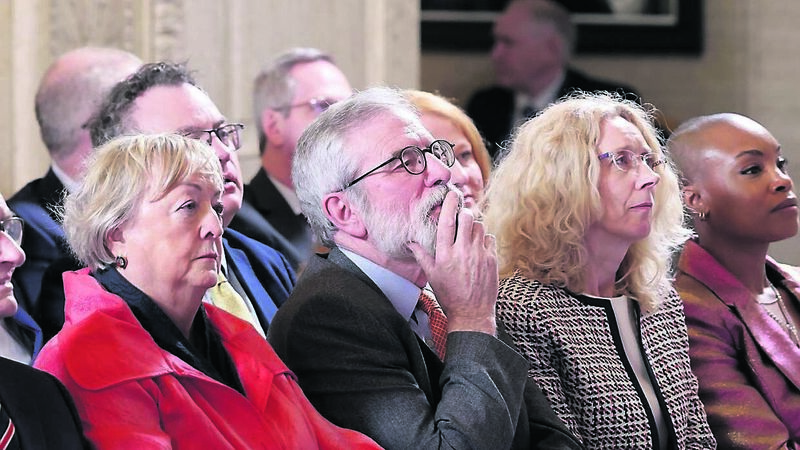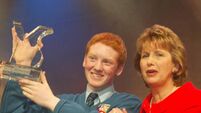I remember the Troubles, we’ll never take peace for granted

‘Good’ in this context is associated with piety, but it is still a day that I think could do with a rebrand.
Listening to the Easter stories this year, remembered thinking as a child, ‘shouldn’t we be getting more upset about these stories’?
The betrayal by friends, public whipping, crown of thorns, taunting and nailing to a cross are awful examples of human cruelty, but the priests and the mass-goers had heard these appalling stories plenty of times before and were inured to the violence. They didn’t seem to be getting upset so I followed suit and let the horrors go over my head.
The horrors of the Troubles are a closer example of how violence and depravity can become commonplace, and growing up, I let much of what happened go over my head.
Again, I wondered how the adults were accepting of something that seemed so sad and scary. That you could be blown up while out shopping on a Saturday afternoon was, in a way, accepted. Accepted, in that it continued for 30 years before a resolution to stop the violence could be agreed.
The reminiscences around the 25th anniversary of the Good Friday Agreement (a much more appropriate use of the word ‘good’) brought back memories.
In the mid-1990s, I found myself wandering around a Belfast graveyard with a gang of teenagers listening to stories of uncles and cousins who had died senseless deaths. Later, we piled into the minivan to visit another graveyard to hear the equally sad stories of the other side.
Green or Orange. Protestant or Catholic. These teenagers with their strong Northern Irish accents all seemed the same to me. In fact, they seemed just like me, except for the cloud of violence that loomed over their lives.
It was a strange excursion for a group of teenagers, but was part of a Cooperation Ireland exchange programme endeavouring to bring young people from all communities in Northern Ireland and the Republic together.
We were excited to go to a new city, stay in a hostel and meet other teenagers. We were maybe a little nervous that we were visiting places that we had only ever heard about previously in news reports.
To me, from cloistered Cork, the Troubles were something that played out on TV. For my entire life, violence and murder had been a regular feature at the other end of the island. The Troubles were normalised because I’d never seen another way of life for Northern Ireland. I didn’t know peace was an option.
I’d watch a politician ‘condemning such atrocities’ but I didn’t see concrete action to stop the anguish. Like the crucifixion story, I wondered ‘shouldn’t we be getting more upset about this’?
As a teenager, I interpreted inaction to stop the violence as resignation. I thought a solution must be impossible because, otherwise, surely, society and governments would stop innocent people being murdered.
In July, 1997, I sat at my kitchen table listening to the late Gerry Ryan and his morning radio patter. His usual cheery banter was replaced by urgent gravitas as he spoke about the restoration of the 1994 IRA ceasefire. Listening to him, I understood the significance of the event and it sounded like the much needed action that had been absent for so long. This was historic.
Just six weeks after the signing of the agreement, referendums were passed by landslide victories (72% in support in Northern Ireland and 94% in the Republic). I was too young to vote in that referendum, but was, and am still, so relieved that peace had come to the island. It’s a peace we can never take for granted.
Measles
The year I was born the world was declared free of smallpox. Almost 200 years after the smallpox vaccine, the first ever vaccine, was developed. Thanks to vaccination the world is free of the deadly disease. It is gone.
Before the introduction of the measles vaccine in the early 1960s, measles claimed the lives of two million people every year.
The World Health Organisation (WHO) estimates that 23.2 million deaths have been prevented thanks to vaccination during 2000-2018.
Measles is a highly infectious virus and can be an acute and serious infection. It causes a rash illness, with cough, runny nose, conjunctivitis and high fever.
For the past two years, many children around the world have missed their routine immunisations because of disruption to healthcare services by the pandemic and measles are bouncing back. Outbreaks have been reported around the world because of low immunisation rates.
Last year, just 88% of Irish kids received their second dose of MMR to protect them from measles, well below the 95% uptake rates recommended by the WHO to stop measles transmission.
The National Immunisation Office has been urging parents to make sure children’s vaccinations are up to date.
The MMR vaccine is the most effective protection we have against measles, and if everyone is immunised we have the prospect of eventually consigning the illness to the smallpox category of human diseases. Gone.







 App?
App?




